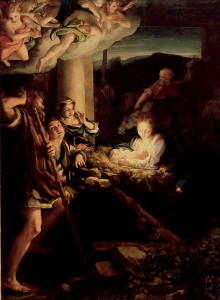Living as Children of God with Joyful Faith
(1 Jn 2:18-21; Ps 95(96); Jn1:1-18)
*********************************************
Suppose you were given cold stone tablets with rules written on them to hold for a while – how would you respond and how would you feel? Then suppose you were given a new-born baby wrapped in soft blankets and smelling of baby powder to hold for a while – how would you respond, and how would you feel? More important, what would be the difference between those two scenarios? My guess – they would be miles apart, and the second would be much more intense than the first.

I think these two imaginary scenarios connect with what St. John had in mind as he was writing both the letter and the gospel we hear today, inviting us to live as children of God with joyful faith in Jesus, not just as dutiful members of a particular religion.
Psalm 96 exhorts both heaven and earth to exult in joy, to sing to the Lord a new song, to rejoice before the Lord who is coming, to tell of his salvation from day to day. It even exhorts the sea to roar and the fields to exult, so great is this good news! This psalm is reminiscent of the response of Elizabeth at the Visitation, who exults and cries out with a loud voice when John the Baptist, the cousin of Jesus, leaps for joy in her womb, and she in turn recognizes Mary as the mother of her Lord! It is hard to imagine that kind of a response to the issuing of a set of laws, but easy to imagine it in response to the birth of a child-king-savior among us. That difference is what the evangelist John is trying to articulate.
St. John differs from the authors of the Synoptic gospels in that he is much more a theologian of mystery, mysticism, memory and symbolism. John is less hard and fast on historical facts then these authors (especially Mark), and relies much more on stories and signs to convey his message of this monumental breaking-into-human-history of God the Father’s love in the person of Jesus Christ. For example, he is so excited about the sending of the Holy Spirit at Pentecost that he places the latter event on the evening of the resurrection of Jesus! Why wait fifty days – he wants us to experience the Holy Spirit now! He also provides us with the reason for our joy.

St John
John writes as an elder, a wise old man, a King in terms of male spirituality, who has had a life-time to reflect on the meaning of the mystery of God at work in humble, mysterious ways through the Incarnation. In exile on the Island of Patmos because of his faith in that same Jesus, he finds himself pondering the difference between the more institutionalized, systemic temple-sacrifice based religion of the Jews of his day, and the more personal, mystical, relational spiritualty and religion that has developed in the early Christian community following the Annunciation, Visitation, Incarnation, ministry of Jesus, Passion, Death and Resurrection, and the sending of the Holy Spirit at Pentecost. In so doing, he quietly invites us to prayerfully ponder these same mysteries, and incorporate their import into our own lives to deepen the maturity of our own faith.
John’s musings center on the difference of grace and truth from adherence to the law, which for the Jews had become centered more on the Talmud and Misnah (additional laws and rabbinic Commentaries on those laws) than on the Torah itself or on the Prophets. As our Israeli guide admitted during our pilgrimage in 2016, the main question for the people to their rabbi was not a moral stance but a concern about what they had to do to be a good Jew – hence the focus on keeping rules and regulations, and choosing a rabbi who would be closer to their own liking.
John, on the other hand, speaks of having been given “grace upon grace.” That grace is the power of the Holy Spirit given to us as a love of God powerful enough to transform our hearts into those who relate to God the Father as God’s own children, in an intimate relationship with God. When that is our foundation, resting secure in the Father’s love is much more important than worrying about what rules to keep as a way of earning God’s love – that becomes insignificant and can fade out of our consciousness, and what freedom there is in that, as well as joy!
John then speaks of truth, of living in the truth, of being grounded in the truth of that love of God that then becomes a light to show us the way to live and move and have our being in God with a certitude and clarity of thought that again frees us from the limitations and constraints of keeping rules and regulations – they are simply no longer that necessary, other than to serve as a guide for beginners in the way of spirituality.
I remember joining the International singing group Up With Peopleas a university student in 1968. As I was considering a vocation to Oblate religious life and priesthood, I decided I would not drink, smoke or date once I was accepted. When I arrived in Santa Fe, New Mexico where they were staging for a tour of Europe, I discovered they had three clear rules: no drinking, smoking or dating. I could not help but be amused as I observed some of the cast members struggling with (and sometimes breaking) those rules, which I didn’t even need as I was already living them by my previous commitment. I realize now this is the spirit St. John is encouraging us all to have in our walk of Christian faith.
The danger of a religious practice based on law and not on love came home to me again during our recent pilgrimage to the Holy Land and a tour of Shiloh. Shiloh is where the Israelites were first able to construct a transitional tabernacle one step up from the portable tabernacle they carried with them for forty years in the wilderness before entering the Promised Land.
Our Israeli guide at that site was carrying a pistol because he was living in an illegal Jewish settlement on Palestinian territory. When I asked him how he could justify that action, he replied simply he was “living by a higher law.” Ironically, that day the readings were about God promising land to the Israelis, but at the end of the same chapter, God admonishes them to care for the aliens in their midst, to respect their rights, to welcome them and provide for their needs. It seems our guide very conveniently ignores that passage while focusing only on the first part. A question we can ask ourselves is how we might be doing the same thing, if we are stressing the law rather than our relationship with God.

Separation Wall Bethlehem
The Eucharist does have some requirements and cultic requirements such as the kind of wine, type of bread and fasting for an hour – but these should never overshadow our intimate, personal, prayerful relationship with our loving Father and his Son whom he sent among us as our brother.
May our celebration strengthen our faith in Jesus as our Lord and Saviour, fill us with joy and empower us to love others as we have been loved.




We should know the truth and understand the truth to be able to speak the truth about the light of God. I agree with the teachings about John explain the truth about God. We should understand who God really is and where he came from than just hearing about it. We are children’s of God when we are born and baptized to be part of God. He has chosen us if we receive his Holy Spirit through Jesus Christ during Charismatic events and the Pentecost . Once we are chosen to be his children, servants and disciples ; we need to learn how to live out the word of God with in the community. We always need to know Jesus as our Lord and saviour because he is the one transforms our lives to a better person from all the bitterness, stubbornness, anger and resentments that is tempting us to sin over and over again. He will lead us to eternal life that is full of joy and happiness. We are free from all sins, constraints and limitations of keeping rules and regulations. Of course we need to obey our parents all the time and respect them. They only wants what is best for us because they took care for us for many years. Amen
Thanks again Bishop Sylvain for the following Homily and pictures . Thanks for sharing your experience and we blessed to be part of Jesus Christ as the Messiah. Happy New Years ! Take care and May you be Blessed in 2019 with all your wishes.